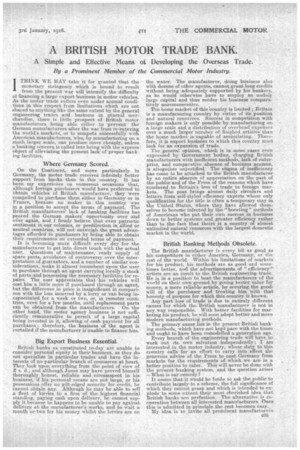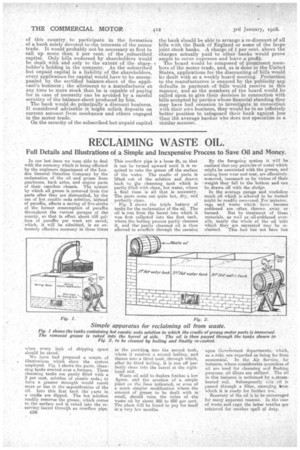A BRITISH MOTOR TRADE BANK.
Page 11

Page 12

If you've noticed an error in this article please click here to report it so we can fix it.
A Simple and Effective Means of, Developing the Overseas Trade. By a Prominent Member of the Commercial Motor Industry.
1 THINK WE MAY take it for granted that themonetary stringency which is bound to result from the present war will intensify the difficulty of financing alarge export business in motor vehicles. As the motor trade suffers even under normal conditions in this resnect from limitations which are not shared to anything like the same extent by the general engineering trades and business in general merchandise, there is little prospect of British motor manufacturers being able either to prevent the German manufacturers after the war from re-entering the world's markets, or to compete successfully with American manufacturers, who, by manufacturing on a much larger scale, can produce more cheaply, unless a banking concern is called into being with the express' object of alleviating the present lack of proper banking facilities.
Where Germany Stored.
On the Continent, and more particularly in Germany, the motor trade received infinitely better support from banks than in this country. It has been my experience on numerous occasions that, although foreign purchasers would have preferred to obtain vehicles of British manufacture, they were compelled to purchasethem either in Germany or in France, because no maker in this -country was in a position to accept the terms of payment. The British manufacturers' lack of banking facilities has proved the German makers' opportunity over and over again, and I firmly believe that even patriotic sentiment in our colonies, or predilection in allied or neutral countries, will not outweigh the great advantages afforded to purchasers by being able to obtain their requirements on extended terms of payment.
It is becoming more difficult every day for the manufacturer to .get into direct touch with the actual user. Questions of maintenance, ready supply of spare parts, avoidance of controversy over the interpretation of guarantees, and a number of similar considerations, make it almost incumbent upon the user to purchase through an agent carrying locally a stock of parts and. possessing the necessary facilities for repairs. The user appreciates that his vehicles will cost him a little more if purchased through an agent, but the difference in price is insiginficant in comparison with the loss incurred by a lorry or van being incapacitated, for a week or two, or, in renioter cotin tries, even for a few months, until replacement parts can be obtained from the manufacturers. On the other hand, the motor agency business is not sufficiently remunerative to permit of a large capital being invested in it, allowing of cash payment for all purchases ; therefore, the .business of the agent is curtailed if the manufacturer is unable to finance him.
Big Export Business Essential..
British banks as constituted to-day are unable to consider personal equity in their business, as they do not specialize in particular trades and have the interests of no particular branch of commerce at heart. They look upon everything from the point of view of X s. d., and although Jones may have proved himself thoroughly honest, reliable and circumspect in his business, if his personal means are not large, or his possessions offer no gilt-edged security for credit, lie cannot obtain any. Although he may be able to sell a fleet of lorries to a firm of the highest financial standing, paying cash upon delivery, he -cannot supply it because he happens to be unable to pay against delivery at the manufacturer's wOrks, and to wait a month or two for his money whilst the lorries are on
the -water. The manufacturer, doing business also with dozens of other agents, cannot grant long credits without being adequately supported by his bankers, as he would otherwise have to employ a-n unduly large capital and thus render his business comparatively unrermmerative.
The home market of this 'country is limited ; Britain is a manufacturing country by virtue of its position and natural resources. Success in competition with foreign makers is only possible bymanufacturing on a large scale and. a distribution of overhead expenses over a much larger number of finished articles than the home market is capable of assimilating. Therefore, it is export business to which this country must look for an expansion of trade.
The general opinion, which is in some eases even expressed by Government bodies, chargiag British manufacturers with inefficient methods, lack of enterprise, and comparative absence of business acumen, is altogether unjustified. The stigma of inefficiency has come to be attached to the British manufacturer by an entire absence of appreciation on the part of the public and of the Press of the reasons which have -conduced-to Britain's loss of trade in foreign markets. The post brings almost daily circulars and letters from self-styled efficiency experts whose only qualification for the title is often a temporary stay in the United States, where they have allowed themselves to become infected by the "boosting" methods of Americans who put their own success in business down to better systema and greater efficiency rather than to the fact that theirs -is a country of almost unlimited natural resources with the largest domestic market in the world.
British Banking Methods Obsolete.
The British manufacturer is every hit as good as his competitors in either America, Germany, or the rest of the world.Within his limitations of markets for his product, his methods are as good and sometimes better, and the advertisements of " efficiency" artists are an insult to the British engineering trade. He is in a position to beat the manufacturers of the world on their own ground by giving better value for money, a more reliable article, by securing the goodwill of the purchaser and treating him with that honesty of purpose for which this country is known. Any part lass of trade is due to entirely different causes for which the British manufacturer is not in any way responsible. With better facilities for market-mg his product, ha-will soon adopt better and more modern manufacturing metheels. The primary cause lies in the present British banking methods, which have not kept pace with the times and ought to have been remodelled a generation ago.
Every branch of the engineering trade will have to work ant its own salvation independently ; I am interested in the motor industry, whose duty to this country calls for an effort to carry into aect the generous advice of the Press to oust Germany from markets for the requirements of which we are in a better position to cater. This will never be done with the present banking • system, and the question arises —What is our remedy? It seems that it would be futile to aak the public to contribute largely to a scheme, the full significance of which they cannot grasp and which is intended to explode to some extent their most cherished idea that British banks are perfection. . The alternative is cooperation between all interested manufacturers. Once this is' admitted in principle the rest becomes easy., My idea is to invite all prominent manufacturers
of this country. to participate in the formation of a bank solely devoted to-the interests of the motor trade. It would probably not be necessary at first to call up more than. 5 per cent. of the subscribed. capital. Only bills endorsed by shareholders would be dealt -with and only to the extent of the sharpA holder's holding in the company. As the subscribed but unpaid capital is a liability of the shareholders, every application for capital would.have to be accompanied by the certified balance-sheet of the applicaa's business; the allotment to a manufacturer at any time to more stock. than he is capable of paying for in, case of necessity can be avoided by a, careful scrutiny of the bilance-sheet produced by him.
The bank would do principally 'a discount business. If considered advisable it 'might solicit 'deposits on current account from mechanics and others engaged. • in the motor trade.
On the security of the subscribed but unpaid capital
the bank should be able to arrange a re-discount of all bills with the Bank Of England or some of the large joint stock banks. A charge of 1 per cent. above the charges actually paid to other banks would prove ample to coVer expenses and leave a profit. The board would be composed of prominent members of the motor trade, and, as is done in the United States, applications for the discounting of bills would be dealt with at a, weekly board meeting. Protection to the manufacturers is ensured by the publicity any defaults in payment of bills would -receive in this manner, and..as the members of the board would be, called upon to give their decision in connection with bills accepted by patties whose financial standing they may have had aceasion to investigate in connection with their own business, they would be in an infinitely • better position to safeguard their bank against loss than thb average banker who does not specialize in a
similar manner. •
























